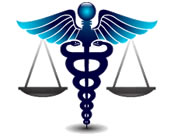

Medical Malpractice Connections

- Access for Laparoscopic Surgery - Negligence
- Anesthesia Negligence
- Breast Cancer Negligence
- Cardiac Surgery Negligence
- Cardiology Negligence
- Common Bile Duct Injury - Negligence
- Critical Care Negligence
- Gastroenterological Negligence
- Hospital Negligence
- Neurosurgery Negligence
- OB-GYN Negligence
- Orthopedic Negligence
- Psychiatric Negligence
- Radiologic Negligence
- Surgical Negligence
- Thoracic Surgery Negligence
- Vascular Surgery Negligence
Cardiology
Cardiology involves the study and treatment of heart diseases. Cardiologists often deal with patients with severe life threatening illnesses, such as a heart attack. Therefore, it is not uncommon for their patients to have a poor outcome, even death. It is necessary to determine if this outcome is due to the underlying disease state, or if it is due to a deviation from the standard of care.
Diagnostic Testing
There are several tests that can be used to study the heart, depending on the symptoms of the patient. These include:
- Electrocardiogram (EKG)
- Stress test
- Echocardiogram
- Nuclear medicine study
- Cardiac catheterization.
The only invasive test is cardiac catheterization. This requires the cardiologist to insert a plastic tube into an artery, either in the groin or the arm, up into the arteries supplying the heart. X ray pictures are then taken to evaluate for strictures in the arteries, and if found, can often be opened with balloons or stents.
Risks
Being an invasive test, there are potential complications that can occur, such as bleeding, infection, stroke, death, kidney failure, and embolism. These complications do not necessarily constitute deviation from the medical standard of care. The following examples, however, may be considered as medical negligence.
Catheterization:
- Substandard pre-catheterization evaluation of the patient.
- Substandard performance of the catheterization.
- Failure to timely diagnose and treat a complication arising from the catheterization despite clinical evidence of such.
- Performance of an unnecessary procedure (as in a cardiac catheterization, or others). Another complication is if the catheter flakes off a piece of cholesterol plaque of the aorta, sending it distally to one of the legs. This can cause an acute blockage of the artery of the leg, which if not treated timely and appropriately, can cause severe complications including the loss of an extremity.
Other cardiologic deviations from the standard of care:
- Failure to timely investigate a patient who is showing the signs and symptoms of a heart attack, and then treat appropriately.
- Failure to interpret an EKG correctly.
- Failure to refer a patient to another specialist.
- Failure to recommend appropriate treatment options that could improve the patient’s symptoms.
- Failure to interpret a stress test correctly.
| Top of page |
| Home | Medical Malpractice Attorneys | Medical Experts | Medical Negligence | Services | Statute of Limitations | About Us | Contact Us |